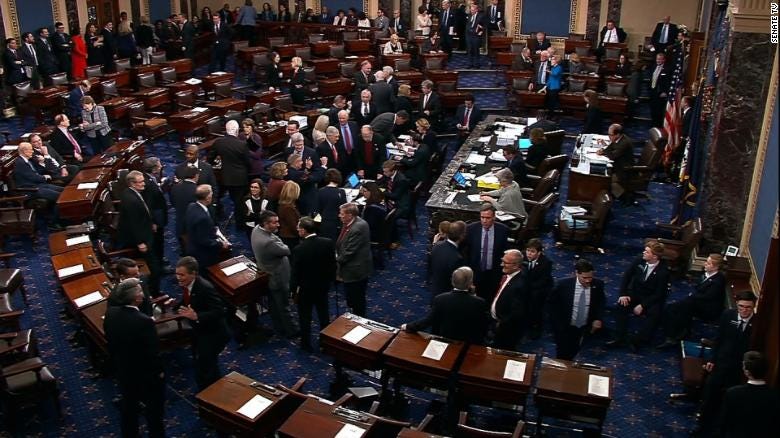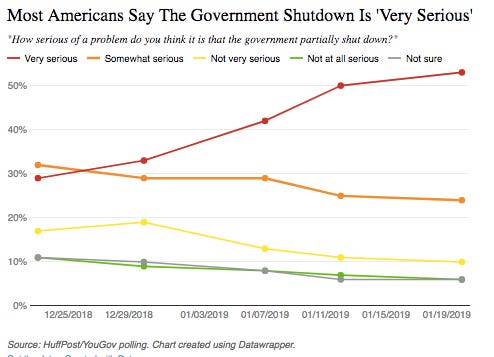
by Charles Ellison | Publisher’s Riff | @ellisonreport
The shutdown, heading into its second month, is making Americans make Congress ask a valid question: is this really worth it? There are already several signs suggesting average Americans are approaching a breaking point. Patience is running thin with each threat of a lost paycheck and bank accounts for many already near empty or running on empty. Even the White House chief economist admits we’re heading into, potentially, zero growth this quarter because of the shutdown. Newscasts of lengthened lines at emergency food pantries are making people gradually realize that a vast number of Americans aren’t prepared to sustain this type of prolonged financial hit - and that includes “federal workers with the good government jobs.” It’s as much of an embarrassing moment for the country because of certain uncomfortable revelations as it is a precarious one that makes everyone nervous.
It’s Sinking In …
A growing majority of Americans are beginning to realize the shutdown is “very serious.” While this is only a glimpse of the overall national mood and doesn’t capture it in more granular state-by-state or Congressional district detail (where you’ll see numbers that explain limited to nominal pressure on Congressional Republicans afraid to turn on the president), it could be reaching a point of critical mass that averts imminent disaster. Says this recent HuffPost/YouGov poll at 53 percent “very serious” and 77 percent “somewhat serious” …

Even a Fox News poll gives it away …

And 40 percent of Americans, according to a Reuters/Ipsos poll, are claiming they’re feeling the impact of the shutdown firsthand.
There is Some Republican Crossover
That votes related to the shutdown even took place in the Senate is considered a significant step in the right direction. It means there is mounting pressure on Senate Majority Leader Mitch McConnell (R-KY) to do something other than not break the impasse.
Of more significance are six Republicans - including a few considered fairly conservative - who jumped over to vote for the Democratic bill to temporarily fund the government through February 8th. Each have their own reasons for coming to the table, from gauging the impact of the shutdown in their respective states to measuring Trump disapproval enough to feel comfortable with a rejection vote: Lisa Murkowski (R-AK) is in a state among the Top 5 most impacted by the shutdown; Susan Collins (R-ME) is in a state among the Top 15 most impacted; approval for Trump in red-state Utah, where Mitt Romney (R-UT) is has dropped 9 percentage points since 2017; disapproval for Trump has risen 12 points in Colorado, where Cory Gardner (R-CO) is, since 2017; disapproval has risen 14 percent in Georgia, where Johnny Isakson (R-GA) is and 12 percent in Tennessee, where Lamar Alexander (R-TN). Gardner and Isakson are concerned about potential challenges in their states; Alexander doesn’t care because he’s not running for re-election in 2020.
Did a Congressional Democratic leader Just Blink … a Little?
Normally, Rep. James Clyburn (D-SC) is considered among some of the more quiet or reserved Members of the House. He holds his cards close. But, there he was on Wednesday with an opening for a compromise on the $5.7 billion “border wall” request and, instead, calling it “smart wall.”
"Using the figure that the president has put on the table, if his $5.7 billion is about border security then we see ourselves fulfilling that request, only doing what I like to call using a smart wall," was Clyburn shortly after a Democratic caucus meeting. "These are the types of things that we are going to be putting forward." And while Democrats might be publicly dismissing the potential of such, the fact that one of the top Democrats in the House is hinting at a “smart wall” concept means there is a desire to float it.
It also means that leaders like Clyburn, who is the most powerful and influential Black Member in Congress, is feeling the pressure.
Not a Revolt, but Signs of Being Fed Up
A letter from 30 House Democrats to House Speaker Nancy Pelosi (D-CA) pleading for an immediate end to the shutdown doesn’t necessarily mean there is an early revolt of Democrats that could shake the very foundation of their majority, but it does mean that the stubborn partisan dimensions of this episode are fraying.
Nearly 60 percent of those members in that letter are in Congressional districts that Democrats flipped from red to blue. Many are from states, like Virginia, that are in the top 10 of the states most impacted by the shutdown.


